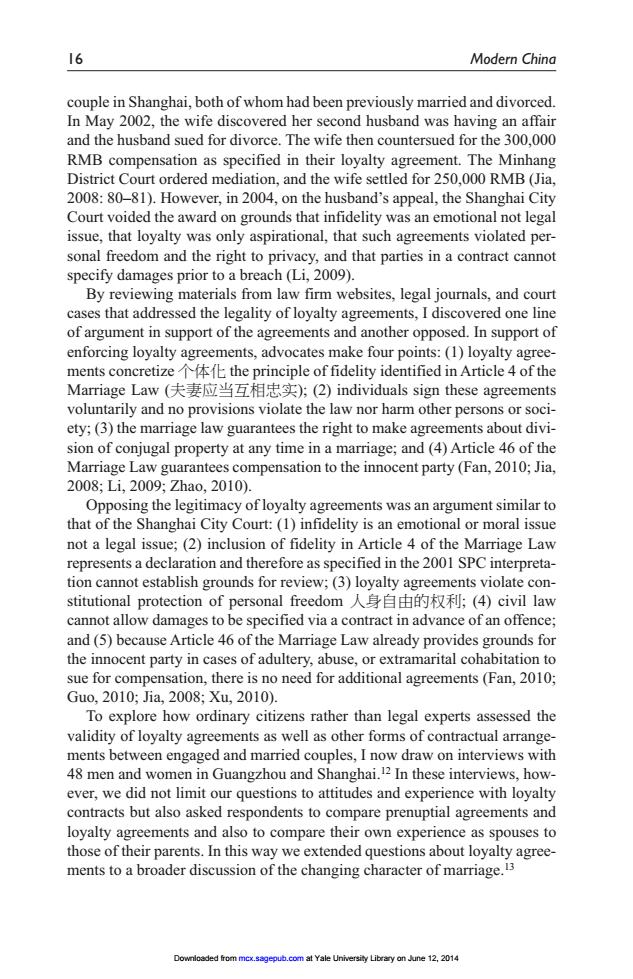正在加载图片...

16 Modern China couple in Shanghai,both of whom had been previously married and divorced. In May 2002,the wife discovered her second husband was having an affair and the husband sued for divorce.The wife then countersued for the 300,000 RMB compensation as specified in their loyalty agreement.The Minhang District Court ordered mediation,and the wife settled for 250,000 RMB(Jia, 2008:80-81).However,in 2004,on the husband's appeal,the Shanghai City Court voided the award on grounds that infidelity was an emotional not legal issue,that loyalty was only aspirational,that such agreements violated per- sonal freedom and the right to privacy,and that parties in a contract cannot specify damages prior to a breach (Li,2009). By reviewing materials from law firm websites,legal journals,and court cases that addressed the legality of loyalty agreements,I discovered one line of argument in support of the agreements and another opposed.In support of enforcing loyalty agreements,advocates make four points:(1)loyalty agree- ments concretize the principle of fidelity identified in Article 4 of the Marriage Law(夫妻应当互相忠实);(2)individuals sign these agreements voluntarily and no provisions violate the law nor harm other persons or soci- ety;(3)the marriage law guarantees the right to make agreements about divi- sion of conjugal property at any time in a marriage;and (4)Article 46 of the Marriage Law guarantees compensation to the innocent party(Fan,2010;Jia, 2008;Li,2009:Zhao,2010). Opposing the legitimacy of loyalty agreements was an argument similar to that of the Shanghai City Court:(1)infidelity is an emotional or moral issue not a legal issue;(2)inclusion of fidelity in Article 4 of the Marriage Law represents a declaration and therefore as specified in the 2001 SPC interpreta- tion cannot establish grounds for review;(3)loyalty agreements violate con- stitutional protection of personal freedom人身自由的权利;(4)civil law cannot allow damages to be specified via a contract in advance of an offence; and(5)because Article 46 of the Marriage Law already provides grounds for the innocent party in cases of adultery,abuse,or extramarital cohabitation to sue for compensation,there is no need for additional agreements(Fan,2010; Guo,2010:Jia,2008:Xu,2010). To explore how ordinary citizens rather than legal experts assessed the validity of loyalty agreements as well as other forms of contractual arrange- ments between engaged and married couples,I now draw on interviews with 48 men and women in Guangzhou and Shanghai.12 In these interviews,how- ever,we did not limit our questions to attitudes and experience with loyalty contracts but also asked respondents to compare prenuptial agreements and loyalty agreements and also to compare their own experience as spouses to those of their parents.In this way we extended questions about loyalty agree- ments to a broader discussion of the changing character of marriage.3 Downloaded from mcx.sagepub.com at Yale University Library on June 12,201416 Modern China couple in Shanghai, both of whom had been previously married and divorced. In May 2002, the wife discovered her second husband was having an affair and the husband sued for divorce. The wife then countersued for the 300,000 RMB compensation as specified in their loyalty agreement. The Minhang District Court ordered mediation, and the wife settled for 250,000 RMB (Jia, 2008: 80–81). However, in 2004, on the husband’s appeal, the Shanghai City Court voided the award on grounds that infidelity was an emotional not legal issue, that loyalty was only aspirational, that such agreements violated personal freedom and the right to privacy, and that parties in a contract cannot specify damages prior to a breach (Li, 2009). By reviewing materials from law firm websites, legal journals, and court cases that addressed the legality of loyalty agreements, I discovered one line of argument in support of the agreements and another opposed. In support of enforcing loyalty agreements, advocates make four points: (1) loyalty agreements concretize 个体化 the principle of fidelity identified in Article 4 of the Marriage Law (夫妻应当互相忠实); (2) individuals sign these agreements voluntarily and no provisions violate the law nor harm other persons or society; (3) the marriage law guarantees the right to make agreements about division of conjugal property at any time in a marriage; and (4) Article 46 of the Marriage Law guarantees compensation to the innocent party (Fan, 2010; Jia, 2008; Li, 2009; Zhao, 2010). Opposing the legitimacy of loyalty agreements was an argument similar to that of the Shanghai City Court: (1) infidelity is an emotional or moral issue not a legal issue; (2) inclusion of fidelity in Article 4 of the Marriage Law represents a declaration and therefore as specified in the 2001 SPC interpretation cannot establish grounds for review; (3) loyalty agreements violate constitutional protection of personal freedom 人身自由的权利; (4) civil law cannot allow damages to be specified via a contract in advance of an offence; and (5) because Article 46 of the Marriage Law already provides grounds for the innocent party in cases of adultery, abuse, or extramarital cohabitation to sue for compensation, there is no need for additional agreements (Fan, 2010; Guo, 2010; Jia, 2008; Xu, 2010). To explore how ordinary citizens rather than legal experts assessed the validity of loyalty agreements as well as other forms of contractual arrangements between engaged and married couples, I now draw on interviews with 48 men and women in Guangzhou and Shanghai.12 In these interviews, however, we did not limit our questions to attitudes and experience with loyalty contracts but also asked respondents to compare prenuptial agreements and loyalty agreements and also to compare their own experience as spouses to those of their parents. In this way we extended questions about loyalty agreements to a broader discussion of the changing character of marriage.13 Downloaded from mcx.sagepub.com at Yale University Library on June 12, 2014